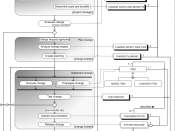Managing Change at
Byfield Business College
Introduction:
Change is inevitable but many people do not like it. There are many methods of implementing change within an organisation. However, for the purpose of this analysis I will limit myself to directive and coercive methods of change management. These methods entail a more authoritarian approach. When people are confronted with the need or opportunity to change, especially when it is enforced, as they see it, by the organization, they can become emotional. So can the managers who try to manage the change. Instead of thoroughly discussing the intended propose of changes with those whose work the changes will affect, changes are often forced upon employees without prior consultation. While this is seen by many as the managers sole responsibility, it can have often negative effects upon the organisation as a whole. Changes of this form are rarely implemented unless the manager is convinced of the positive benefits the changes would bring, or the manager has little regard for the opinions expressed by his employees.
In either of these situations the manager must have sufficient power and authority within the organisation, that there will be little or no opposition from those affected.
The fundamental issue here is how mangers see themselves in organisations. They often overestimate the amount of power and authority they actually possess which usually turns to de-motivate the workforce. A manager who tries to learn very fast the cultural and politics in the work environment will in no uncertain terms achieve desirable outcomes. For employees to feel that they enjoy the tasks set before them, the manager should strive to blend tactics which will allow him to achieve a large amount of power and influence while retaining the respect and co-operation of his subordinates.
The product of measures are beneficial...


